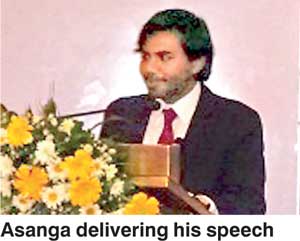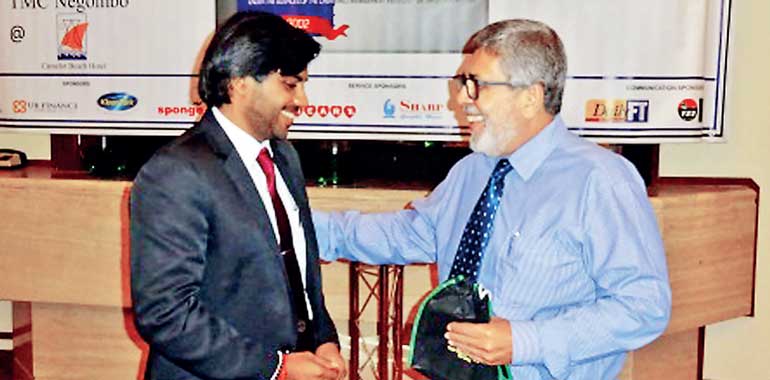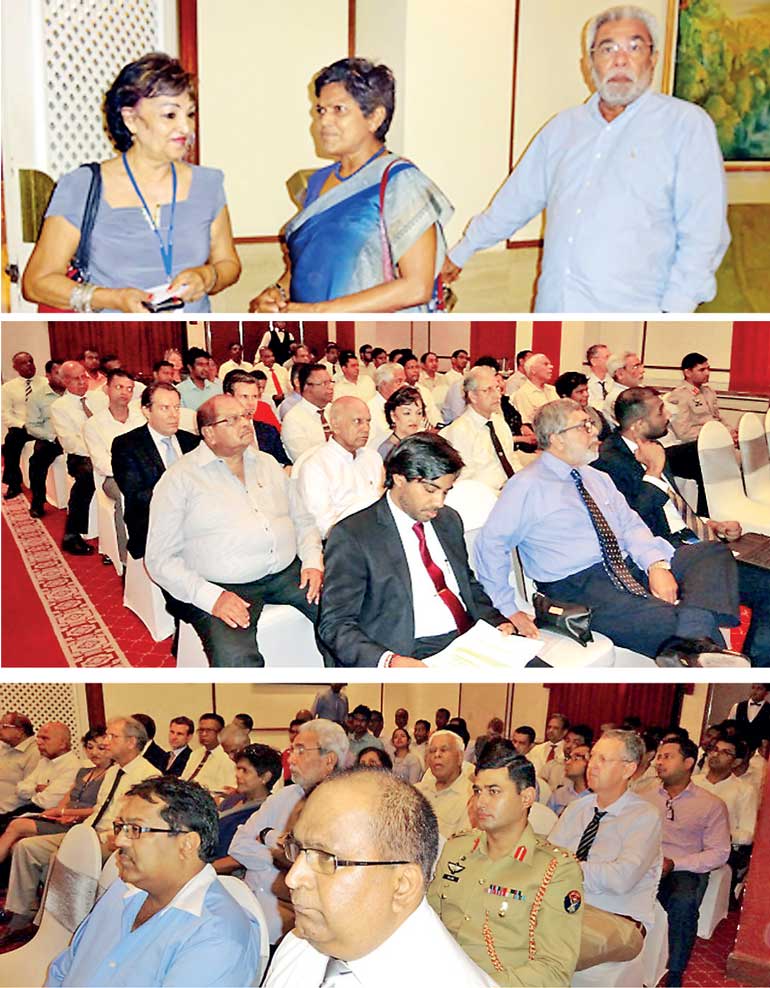Friday Feb 27, 2026
Friday Feb 27, 2026
Monday, 20 November 2017 00:00 - - {{hitsCtrl.values.hits}}
Asanga Abeyagoonasekera, Director General of the Institute of National Security Studies Sri Lanka (INSSSL), delivered a lecture titled ‘Sri Lanka Facing the Geopolitical Game in the Indian Ocean’, at The Management Club’s (TMC) Member Meet held on 14 November at the Galadari Hotel. It was attended by heads of diplomatic missions, public sector officials and the private sector. The speaker was introduced to the audience by TMC President Emeritus Fayaz Saleem.

To begin with, Abeyagoonasekera identified Sri Lanka as a geopolitical ‘Super connector’ in the region, while highlighting the importance for the island to maintain friendly ties with neighbouring countries and extra-regional powers. Sri Lanka’s strategic location depicted since ancient history by Ptolemy to the Hellenistic scholars was discussed. The geo-strategic position of the island was further discussed, reviving the works of Sir Halford Mackinder and Alfred Thayer Mahan.
Thereafter, he brought the discussion into the geo-political context of the 21st century. The Chinese presence in the region, the continuing political pressure asserted by India on Sri Lanka as well as the significant influence of the USA in the Indian Ocean region (IOR) comprised this dynamic. In this regard, the speaker emphasised the need for our nation to proactively face any future challenge by fostering strategic relations within the Indian Ocean security environment, as it is where the ‘great game’ of the major powers will be played in the future.
On the topic of foreign policy in the IOR, balancing New Delhi, Washington and Beijing was stated as a priority for the Sri Lankan foreign policy. President Sirisena has rightly articulated this dynamic in his foreign policy as ‘balanced Asia centric’. Moreover, the speaker advocated a consistent foreign and defence policy that should be clearly introduced to the public by both ministries. Sri Lanka could cooperate in a security dialogue in the IOR through Maritime conferences as well as demilitarising and de-securitising the Indian Ocean. Additionally, the speaker put forth the engagement of Tamil diaspora with a precise re-engagement plan as crucial towards an effective foreign policy for the country. The speaker referred to the late Sri Lankan Prime Minister Sirimavo Bandaranayaike’s proposal for an Indian Ocean Peace Zone (IOPZ) to elucidate the necessary trajectory that the country should take. He also noted the exceptional calibration of foreign policy of the late Lakshman Kadirgamar to ‘balance the west and the rest’ in this context.

TMC President Emeritus Fayaz Saleem handing over a token of appreciation
Abeyagoonasekera, remarked that regional powers should recalibrate their foreign policy – one that is attuned to the IOR. Specifically, India should move out of the ‘Monroe doctrine’ approach adopted by the late Indian Prime Minister Jawaharlal Nehru. While Prime Minister Modhi’s strive to create a collaborative role with regional countries is a positive sign, its additional policy of keeping the extra-regional powers at bay in the IOR, will only be to its own detriment.
In an effort to localise the discussion, the speaker highlighted the significant sphere of influence of Tamil Nadu geographically in the North of Sri Lanka. He stated that this was clearly evident when examining the past political history of the 30-year conflict which was fuelled by the South Indian State. In this context, geopolitics has to be considered when amending the present constitution and while federalism is a good model for India it is not suitable for Sri Lanka due to the Tamil Nadu sphere of influence.

Sections of the guests
Abeyagoonasekera then forewarned the audience that the IOR is a pivotal area in this century and to understand the geopolitical game one must assess the ongoing risk and future risk to Sri Lanka. He thus underlined the importance of Foresight Analysis and understanding strategic risk when undertaking large scale infrastructure projects as it is vital towards sustaining the Sri Lankan economy. Similarly, he noted the significance of devising precise policy prescriptions in order to face geopolitical challenges.
Abeyagoonasekera concluded his lecture by stating, “Sri Lanka with its geostrategic position will always have an influence from the Indian Sphere of Influence centred in South India, the Chinese Sphere of influence centred on One Belt One Road initiative and the US Sphere of influence centred on a US pivot to Asia.” In this regard, Sri Lanka has received more than 200 warships since 2010. While the island receives warships from all these nations due it strategic location within the overlapping sphere of influences, there should not be any controversy in receiving Chinese submarines specifically. Sri Lankan security policy makers have carefully crafted these policies and they are not based on ‘knee jerk reactions’. Finally, Abeyagoonasekera stated the importance of public consultation when formulating national policies since sovereignty is constitutionally vested in the people. This right of the people has to be extended to issues in geo-political arena of the IOR.